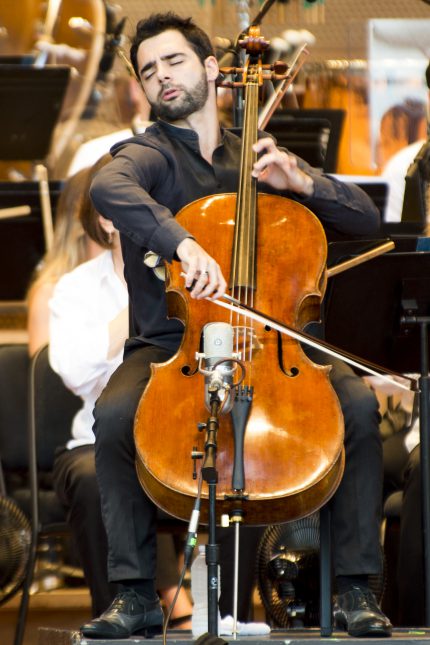Ferrández gives a stunning Prokofiev premiere with Grant Park Orchestra

This season’s Grant Park Orchestra schedule features two of the most substantial works for solo cello and orchestra, making it a good summer downtown for enthusiasts of the instrument and its repertoire. At the end of June Johannes Moser gave an assured account of the Dvořák Cello Concerto, and last night Prokofiev’s Sinfonia Concertante received a stunning GPO premiere with the dynamic young cellist Pablo Ferrández.
The Sinfonia Concertante in E Minor, Op. 125, was the product of a collaboration between the composer and renowned cellist Mstislav Rostropovich, who worked closely together on the work near the end of the Prokofiev’s life. Rostropovich even moved into Prokofiev’s country home for a summer so the two could collaborate intensely. The product is a polychromatic score that makes demands on its soloist as considerable as any other cello concertante work.
Pablo Ferrández was clearly game for the challenge. From the searing treatment the 25-year-old Spanish cellist gave the opening statement, it was clear that for him the technical challenges of Prokofiev’s writing were all but an afterthought. Most impressive was that Ferrández never lost the melodic thread that runs through Prokofiev’s knotty solo part, always attentive to longer lines even in the most pyrotechnical passages. In this he was well supported by GPO artistic director Carlos Kalmar and the Grant Park players.
Ferrández and colleagues imbued the mechanistic opening of the sprawling second movement with a manic, motoric quality, and the young cellist rendered the contrasting lyrical portion with tenderness that never lapsed into bathos. Here again it was the attention paid to the overarching melodic lines that gave the performance a sense of vitality, rather than lapsing into mere virtuosic display.
The unfolding variations of the final movement were well characterized, and as a whole had a dancelike, almost Baroque lilt, though never losing Prokofiev’s trademark edginess. Ferrández flicked off his stratospheric final statement with aplomb and was promptly met with well-deserved thunderous applause.
The second half opened with The Unanswered Question of Charles Ives. One of the most striking aspects of this work is that it was written in 1906, its forward-looking modernism still novel over a hundred years later. Unfortunately the overloud amplification in the Pritzker Pavilion compromised the work’s atmospheric qualities—particularly the strings’ “Silence of the Druids”—but the philosophical detachment of principal trumpet David Gordon’s intoning of “The Question” came off well.
Kalmar proceeded directly from the Ives into Ralph Vaughan Williams’ Symphony No. 4 without pause. That move felt gimmicky: both pieces are startlingly modern, but that does not mean they should be tied together in this way.
Vaughan Williams is of course primarily known for the pastoral lyricism of his oeuvre, yet his Fourth Symphony is unlike most of his output. The whole symphony is organized around motivic cells that are manipulated to produce its themes, and its harmonic language is unrelentingly dissonant.
Kalmar led a vigorous, unapologetic performance that fully projected the score’s angst. The harmonic crunch of the opening Allegro’s initial statements was jarring, and the conductor lent sweep to the movement’s expansive second theme. The Andante moderato at times approached the bleakness of Shostakovich’s dystopian soundscapes, and Kalmar and the Grant Park players projected the movemnent’s troubled, melancholy air.
The ubiquitous bounding fourths of the Scherzo were driven and insistent, and the Trio came off as a nervy, skittish dance. The Finale had a mechanistic quality more than a little reminiscent of the first half’s Prokofiev, an affinity one would never ordinarily suspect. The symphony’s closing Epilogo Fugato sounds as though the music is on the verge of collapsing on itself, and Kalmar instilled energy to the exhausted, defeated end.
In his opening comments Kalmar mentioned that Vaughan Williams’ Fourth Symphony is sometimes considered wrongly as a prophecy of the strife that was to consume Europe shortly after its premiere in 1935. Yet Vaughan Williams saw combat in the First World War, losing many younger friends in the conflict. If his Fourth Symphony has any historical reference, it could just as likely be from that earlier trauma, rather than the ones to come.
The program will be repeated 7:30 p.m. Saturday. grantparkmusicfestival.com/
Posted in Uncategorized



Posted Aug 12, 2018 at 9:55 am by Odradek
Excellent review. I caught the Saturday concert. For me the Vaughan Williams was the highlight – Kalmar always does a superb job with this composer.